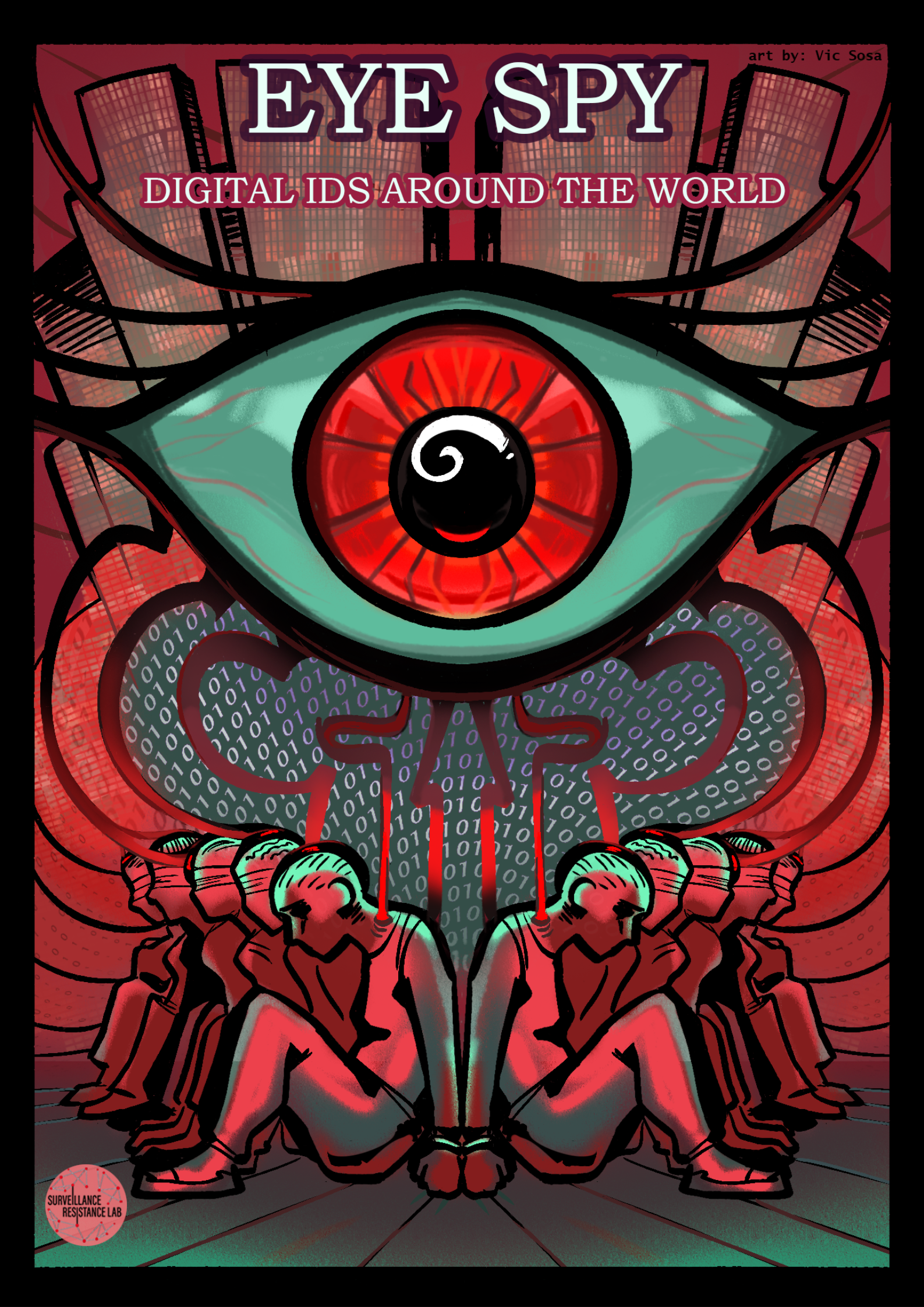Why organizing against digital driver’s licenses is necessary for combating mass surveillance
Welcome to Surveillance Resistance Monthly, the Lab’s monthly newsletter that focuses on challenging the technologies that fuel state and corporate power. Alongside others, we seek to strengthen our collective analysis of these technologies of violence and control. We also aim to build, nurture and accumulate the power of organizing and resistance—locally and transnationally— against these technologies and the powers behind them.
Subscribe here, follow us on social media [on IG or X], or head to our website to learn more.
INTRODUCTION TO THIS ISSUE
Governments use identification to categorize and sort people—at the airport, the welfare office, or bank—to determine if you should be granted or denied access or a service.
While identification allows for access to benefits and rights, it also marks people out for punishment—based on race, gender, visa status and other social markers. Identification shapes and reinforces power structures and social hierarchies. What happens when its scale and speed is enhanced through digitization?
Proponents of digital IDs systems claim they prevent fraud, as well as expand democracy, access to services, and financial inclusion. Yet in practice these systems, in Australia, India, South Korea, Indonesia, Nigeria, Uganda and elsewhere, have been shown to increase policing, criminalization, exclusion, data breaches, and corporate profiteering and control of government services. Evidence shows trans people, Indigenous communities, undocumented people, dissidents, public benefits recipients, and those fleeing violence bear the brunt of these impacts.
Digital driver’s licenses (dDL) are quietly and rapidly remaking how identification functions in the United States. dDLs, a “smart city” technology, are promoted as providing functions that physical licenses do not. This includes signing up for social services, utility assistance, tax refunds, opening bank accounts, buying products online or accessing age-restricted content (due to the adoption of online age verification laws in several states). Along with digital wallets and the push to end cash, dDLs facilitate widespread state and corporate surveillance.
Who are the drivers of digital ID systems and who benefits? The Department of Homeland Security (DHS) and tech companies (e.g. IDEMIA) have teamed up with financial services firms (e.g. Mastercard) to set up for a lucrative data grab and highly effective tracking system. Personal financial data, alongside its arsenal of personal data from other sources are not only profitable, but ultimately serve as tools for policing. dDLs allow DHS to more efficiently track down and target (im)migrants, protesters, workers, and people traveling for medical care across the country. This unprecedented infrastructure of mass surveillance, integrated with the finance system by design, is already in development in over forty states. Despite these profound consequences, this is taking place with complete disregard for any democratic processes—being brought in by cops and corporations without public debate or engagement from impacted communities.
And yet, dDLs are not inevitable. Join us to learn more about resisting the rise of digital IDs in your state and protecting our rights in states with existing programs.
We hope you enjoy this issue! If you have feedback or resources to share, please do get in touch.
In solidarity,
The Surveillance Resistance Lab team
WHAT’S ON AT THE LAB?
OUR PUBLICATIONS
Smart-City Digital ID Projects: Reinforcing Inequality and Increasing Surveillance through Corporate “Solutions” — Written by Mizue Aizeki (the Lab’s Executive Director) and Rashida Richardson, this 2021 report documents how digital ID systems are core to “smart city” strategies drawing from case studies of digital ID programs across the world. It includes a case study on how organizers foiled the attempt by corporations and City administrators to turn the IDNYC into a digital ID.

Mobile Driver’s Licenses and the Costs to Privacy, Safety, and Security — This community guide is an 101 explainer on what dDLs are and how they work. It answers questions like: What are the potential risks and impacts of wider dDL use? What are the interests behind dDLs? Which communities will become less safe?
Mobile Driver’s Licenses and the Costs to Privacy, Safety, and Security — This webinar hosted by the Surveillance Resistance Lab and the National Immigration Justice Center provides an introduction of the harms of dDLs and how communities can organize against this powerful technology.
COMING SOON: EYE SPY Trivia Game — Given how digital ID systems obscure historic and current power dynamics, we have created this trivia game about digital ID systems around the world. Check out the next issue of Surveillance Resistance Monthly to play.

EVENTS BY OUR PARTNER ORGANIZATIONS
Take Back Tech 2024 — On June 21-23, Mijente and Media Justice co-convened a conference that brought together organizers, advocates, academics, and workers to deepen the connections and strategies needed to combat technology's worst harms.
Mizue moderated a panel discussion featuring Ruha Benjamin (Ida B. Wells Just Data Lab) and Jacinta Gonzalez (Mijente and #NoTechforICE) titled Resisting Borders and Technologies of Violence: Imagination towards Liberation (you can listen to the recording here).
Dhaksh Sooriya (Senior Research Fellow at the Lab) participated in a panel Here, There, and Everywhere: Global Perspectives on the impact of tech (you can listen to the recording here) alongside Alex Hanna (Distributed AI Research Institute), Paula Guerra Cáceres and Paz Peña.
Ed Vogel (Senior Researcher and Organizer at the Lab) and Dhaksh also hosted a workshop on Organizing Against the Global Expansion of Digital IDs and Automated Policing where participants learned about the growing adoption of dDLs in the United States and how this form of digital ID is likely to exacerbate existing structures of violence and oppression.
Data 4 Public Good Conference hosted by the Twin Cities Innovation Alliance — On July 18, the No Tech Criminalization in Education Coalition or NOTICE coalition (of which Surveillance Resistance Lab is a member) hosted a panel titled Challenging Carceral Technologies in Schools at the Data 4 Public Good conference. Ed Vogel and his fellow panelists described the rise of digital technologies in schools and how these technologies are evolving the school to prison pipeline while also offering visions for how we build power to realize schools liberated from corporate and police control. To learn more about our work on surveillance technologies in schools you can read this previous issue of Surveillance Resistance Monthly.
UPCOMING EVENTS
The Socialism 2024 Conference — Join Surveillance Resistance Lab in Chicago from August 30 to September 2. At this critical juncture, the conference will be a vital gathering space for those fighting for racial and social justice.
Mizue Aizeki will be moderating a panel discussion on Building Solidarity, Unbuilding Borders: Fighting Tech-Augmented Apartheid in Palestine and Beyond, with panelists Marwa Fatafta (Access Now), Matt Mahmoudi (University of Cambridge) and Kate Sim (organizer, No Tech for Apartheid).
The Lab is also co-hosting a panel titled Democracy, Techno-fascism, and the Capitalist State, with Thomas Mariadason, the Director of the Center for Political Education. Thomas and Mizue will be joined by Madi Day (Department of Critical Indigenous Studies, Macquarie University, Australia) and Nikita Sonavane (Criminal Justice and Police Accountability Project, India) for this conversation.
RECOMMENDED RESOURCES ON DIGITAL IDS AROUND THE WORLD
Digital ID systems not only make us more legible to the state, but also to global institutions at the center of the push for digital IDs— including intergovernmental organizations (e.g. UNHCR), global north governments, development agencies, multinational tech and finance corporations, and philanthropic organizations. Here we have collected some books, articles and art that look at the global dimensions of digital ID systems:
- Uganda’s Sweeping Surveillance State Is Built on National ID Cards — this investigation published by Olivia Solon in 2024 details how Uganda’s governmental leaders built a massive biometric database to surveil and target political opponents.
- Fantasmas: New TV series — A review of Julio Torres’ new HBO series Fantasmas in TIME magazine states that it is: “preoccupied by the bureaucratic apparatus that seeks to not just standardize but monetize identity. If the show has a villain, it’s a surveillance-capitalist nightmare called Proof of Existence—a monolithic new form of identification that collects every imaginable variety of personal data, charges a monthly subscription fee, and is fast becoming a requirement for obtaining everything from employment to housing. Julio wants to opt out, but the effects on his livelihood could be devastating.”
- Impacted Communities’ Experiences of Digital IDs — This series of reports by the Engine Room explores how failing to center the experience of ID users has led to digital ID programs that increase surveillance and cause various harms to marginalized peoples.
- Creeped Out By Aadhaar, India’s Digital ID — this 2023 article from Rita Banerji investigates the largest digital ID system in the world, Aadhaar, and how it came to dominate and control the lives of people in India.
- Surveillance Concerns as India Issues New digital IDs in Kashmir — this 2023 article published by Al Jazeera describes the Indian government’s introduction of a new family digital ID tool in Kashmir.
- Stories from (Un)Identified Worlds: A Speculative Anthology — In 2022, the Berkman Klein Center for Internet & Society conducted a research sprint with partner organizations to produce a series of speculative fiction stories envisioning alternatives to digital identity in the future.
- dDLs in New York — this article outlines the launch of New York state’s new mobile ID program.
